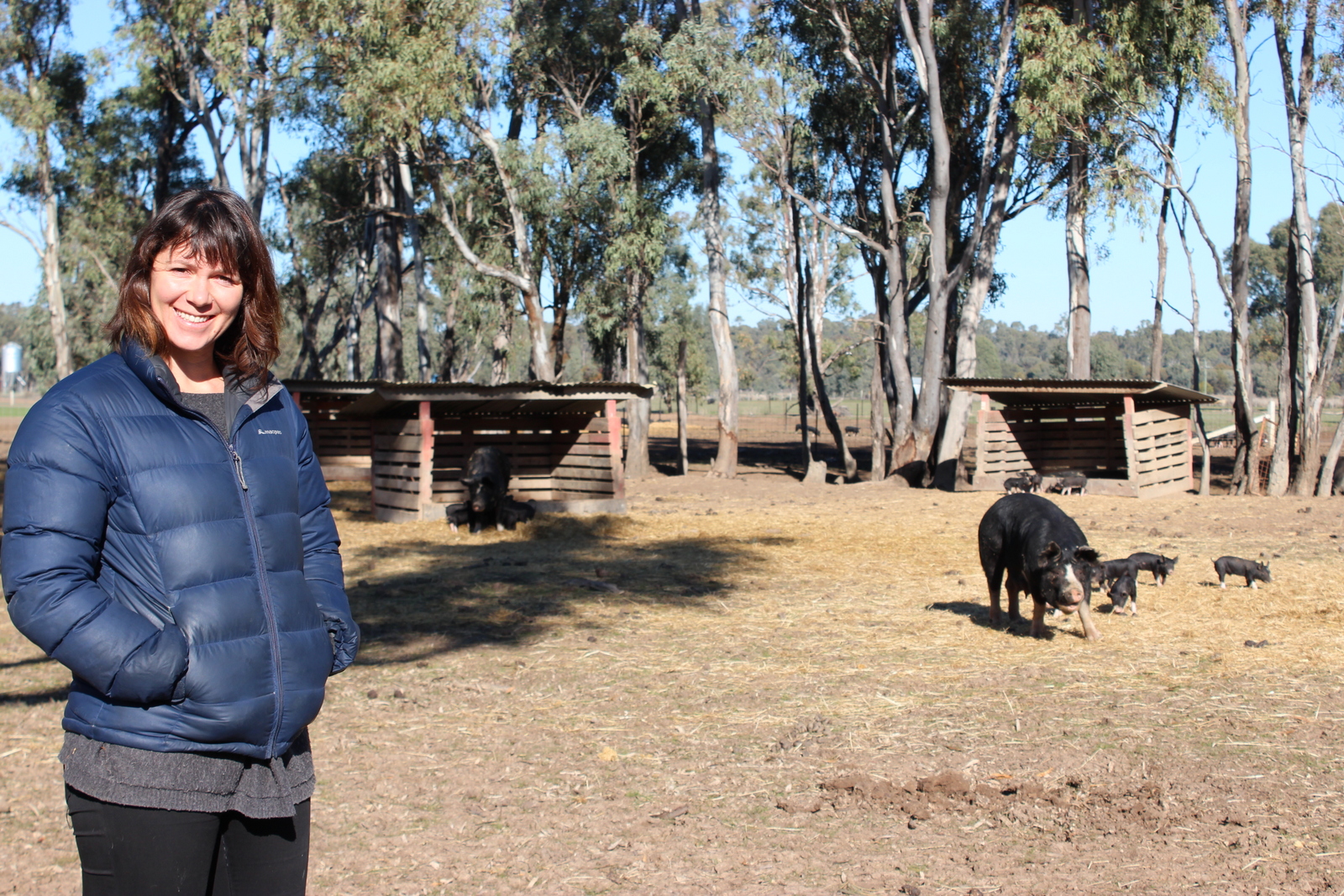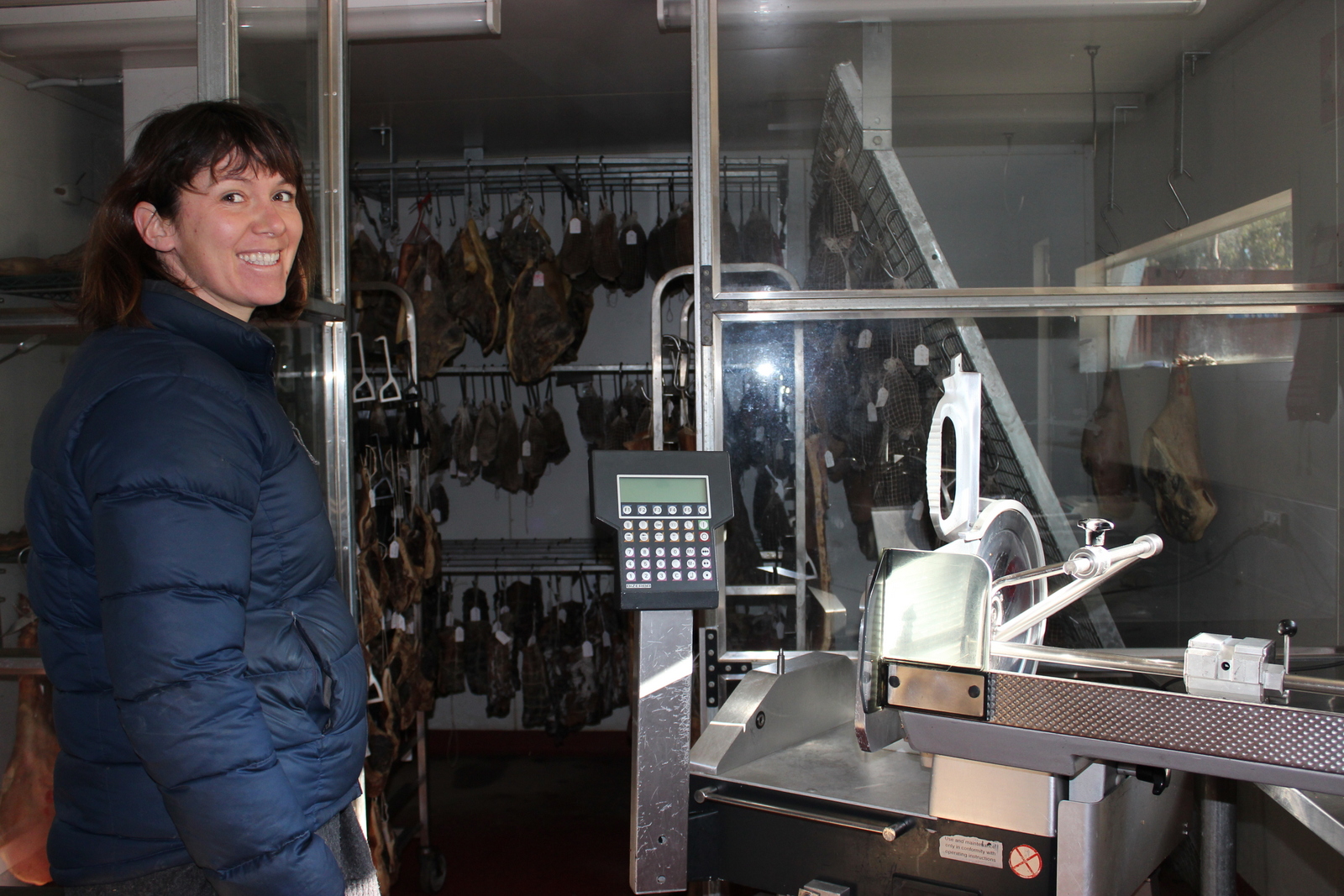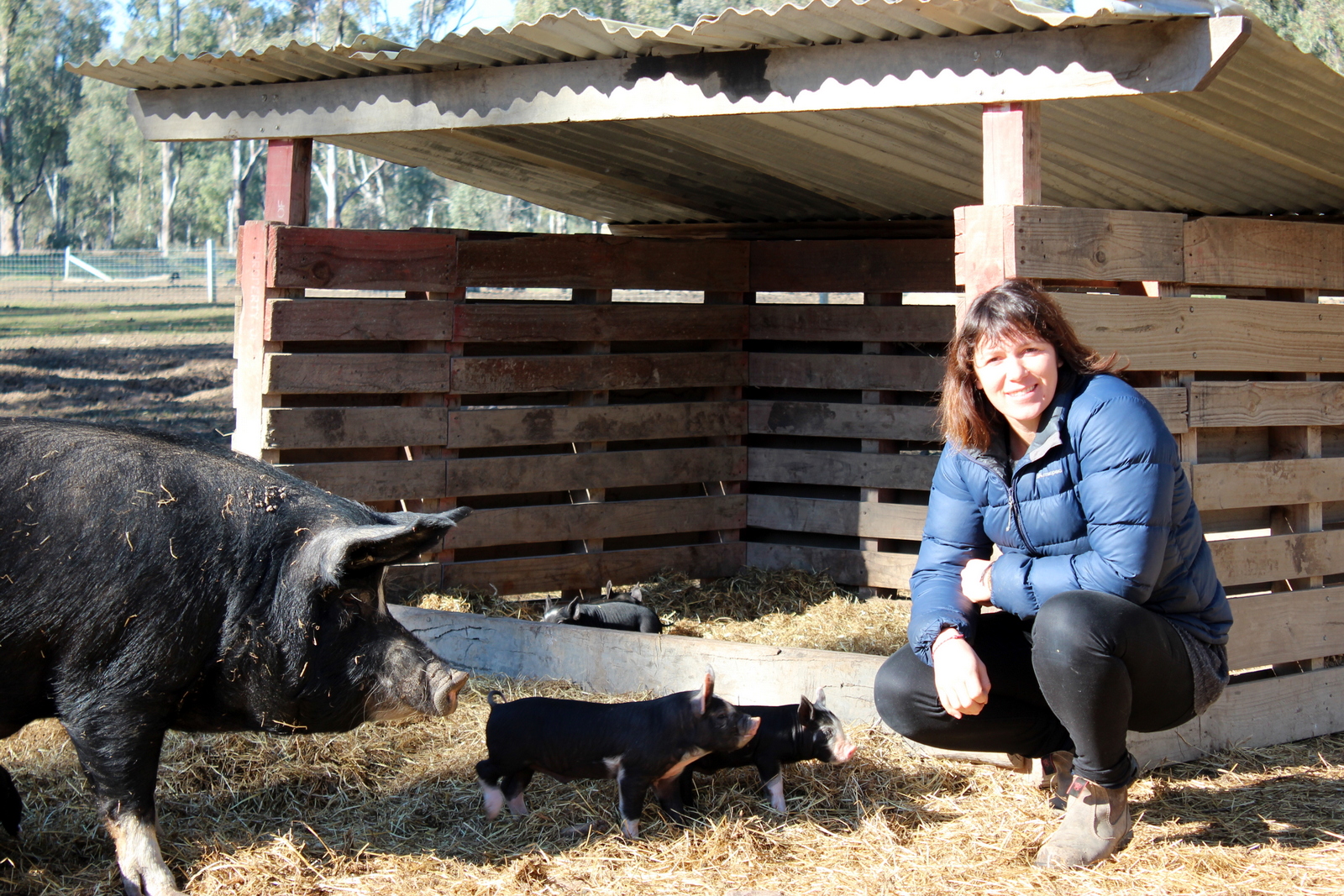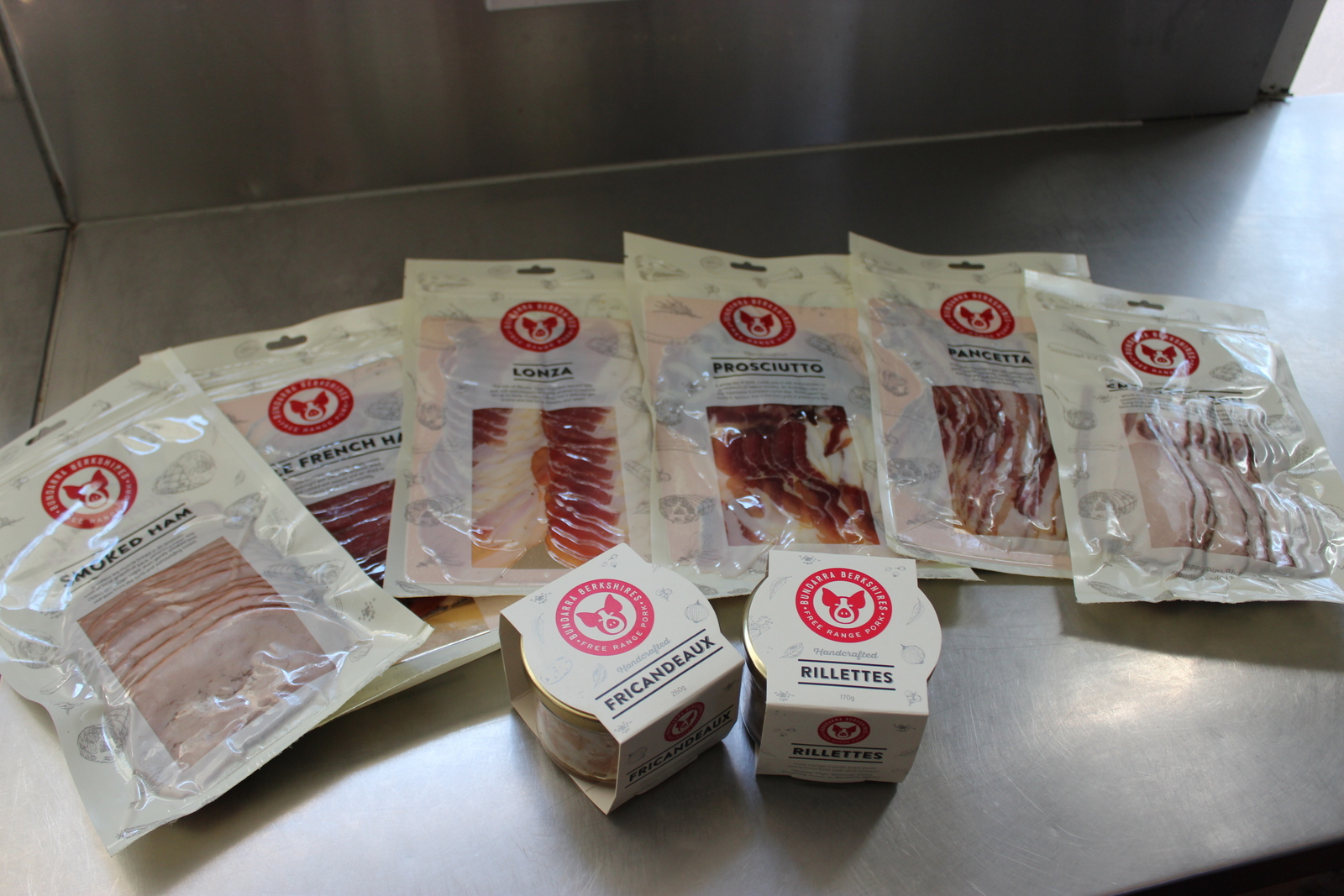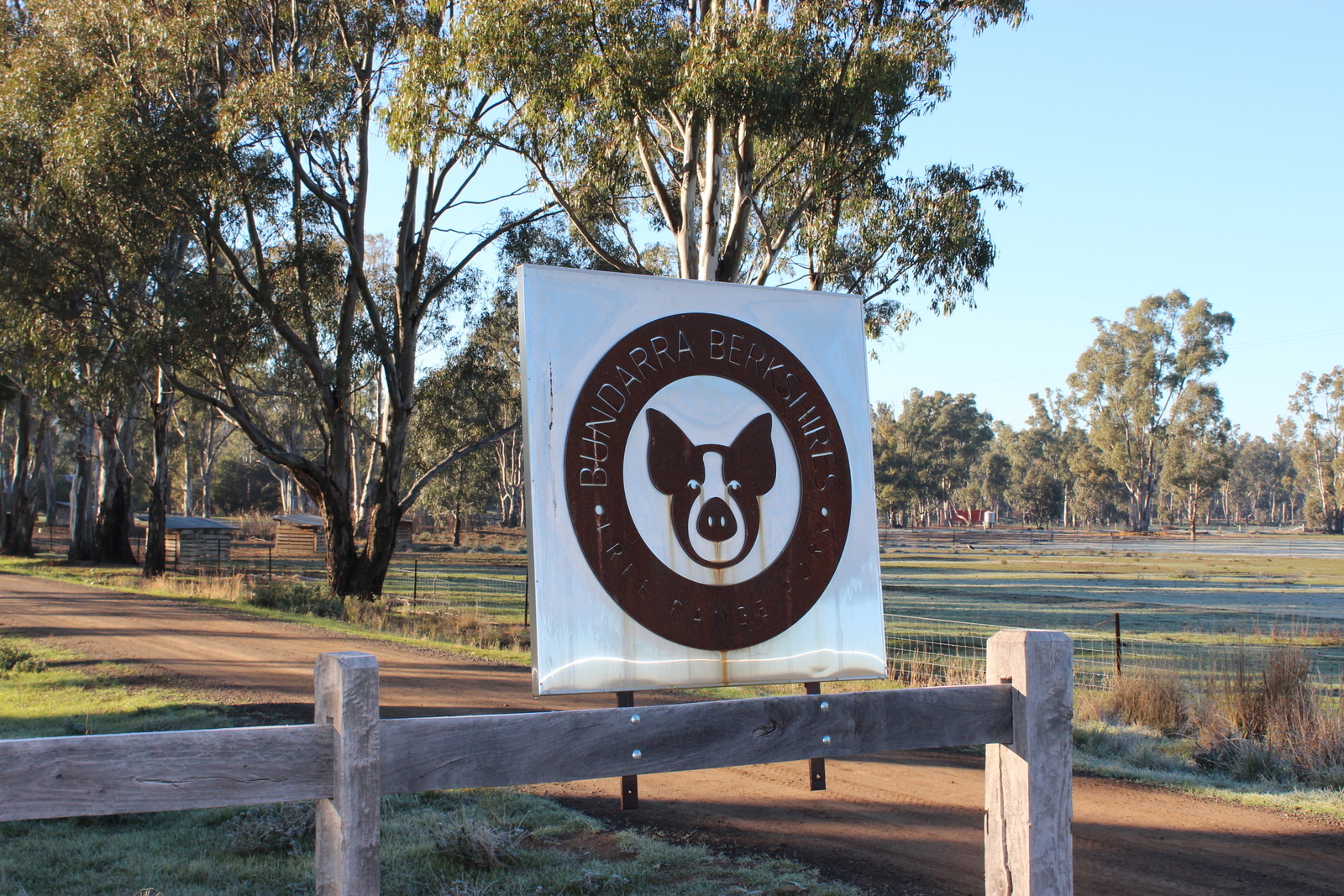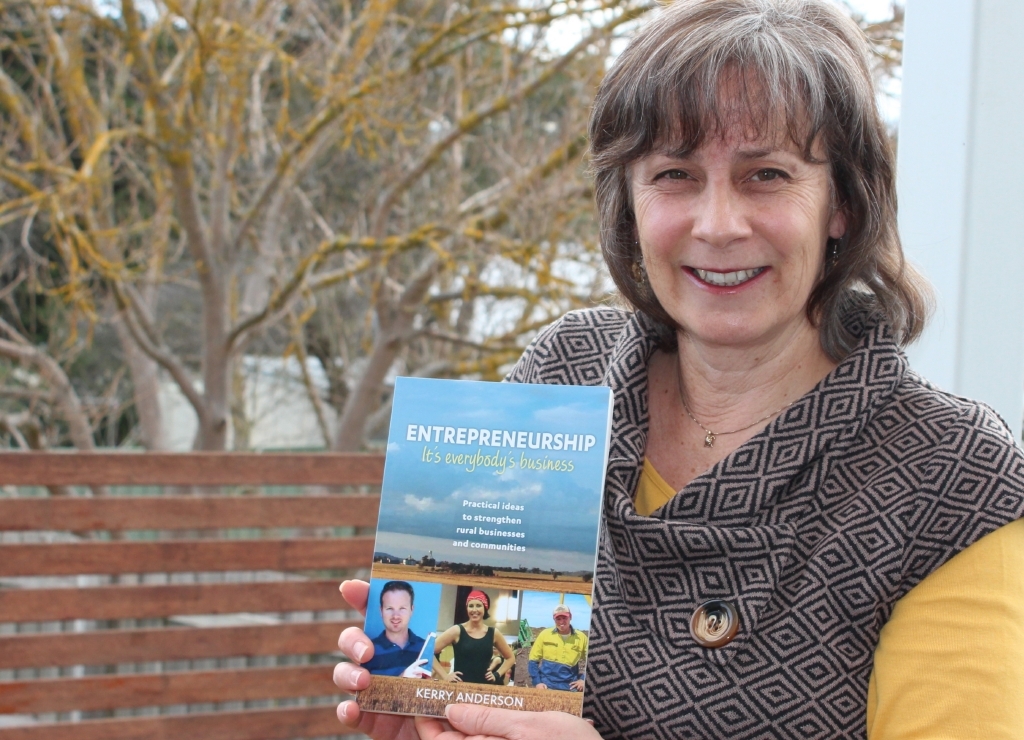Bundarra Berkshires
Looking back at how Bundarra Berkshires evolved Lauren Mathers defines it as ‘madness’ given that she has given birth to three children in the midst of becoming a free-range farmer and exemplifying the paddock to plate dream. Displaying the attributes of a true entrepreneur, it all started when she saw a problem that could be turned into an opportunity. And history keeps repeating itself.
Arriving at the Mathers property near Barham in New South Wales early one brisk Saturday morning mid-winter, it comes as no surprise that bacon and eggs are on the menu. The kids are sleeping in and Lachlan and Lauren are planning their weekend ahead. No football. No socialising. Weekends are the best time for the couple to do the hands-on work required to care for their 400 plus Berkshire pigs.
‘It’s madness when I look back. I used to do it all, but Lachlan stepped in and shared the responsibilities as the children came along,’ explains Lauren. A transport driver for his parents’ company during the week, Lachlan has been pleasantly surprised at how enjoyable it has been to get involved in the business that has now built up to become their main source of income. ‘I’m trucks by day and pigs by day, night and weekends,’ he smiles. ‘Dad and husband is in there somewhere as well.’ All jokes aside he adds that he is enjoying his new role.
‘Lachlan is a great salesman and loves chatting with the customers and fellow stallholders,’ Lauren chips in. ‘Until he started coming to the markets with me he’d never seen that side of the business.’
With our plates empty I chat with Lauren over coffee as Lachlan deals with the waking kids. It quickly becomes apparent how her brain operates. Constantly. Very fast. And, there is no doubt, she is a problem solver. ‘If I think of a good idea I just run with it,’ she admits.
OPPORTUNITY #1 Sourcing local quality pork
As a partner in the successful The Long Paddock restaurant established in 2008 at nearby Koondrook on the Victorian side of the Murray River, Lauren had her first experience of small business. The restaurant’s reputation was built on an ethos of sourcing local quality foods but she was having trouble finding tasty pork. This is how Doris first came on the scene.
‘A bloke down the road had a Berkshire pig that he didn’t want any more,’ Lauren explains, ‘so I reckoned I would have a go at breeding my own pork.’ Being raised on a beef cattle farm, however, was of no use whatsoever when it came to collecting the founding member of her breeding stock. With the owner absent Lauren tried to herd the pig – later named Doris - on to the trailer. ‘She was like a wild dog,’ Lauren recalls. ‘My first lesson was in how to bribe pigs with food and make it a positive experience.’
While Doris failed to have any produce for some time, ironically Lauren fell pregnant with her first child. Undeterred, the seed of an idea just grew and grew, fuelled by a bursary as a Rural Ambassador to visit France and see how farmers there sold their produce at markets and the relationship between consumer and farmer.
Eight years since establishing the herd, Lauren now has over 100 sows and 300 piglets at any given time to care for. And, for those of you who are wondering, Doris lived on despite her shortcomings, eventually passing away from natural causes.
OPPORTUNITY #2 Finding customers
‘It was clear when I came back from my trip to France that we needed a local market so I helped to set up Red Gum Group and Farmers’ Market,’ Lauren explains. ‘Now there are lots of Farmers Markets which everyone loves. Until recently we regularly attended the Melbourne markets and will continue to attend the Castlemaine market each month and possibly get back into Melbourne once a month now that Mum and Dad are here to help out.’
In 2011 Lauren started selling the pork and by late 2011 was selling gourmet pork products to retail outlets and at farmers markets. ‘Winning a Delicious Product Award in 2013 was a great kick start,’ she acknowledges.
Bundarra Berkshires has its own website and Farm Shop page outlining products that can either be purchased at one of the listed stockists or delivered through their courier service. Hogfest, held each September, promotes the ‘paddock to plate’ concept and connect customers with their products. Social media has clearly been a winner with a healthy following on Facebook and Instagram. Quality photography assists Lauren to clearly articulate their love of animals and a rural family lifestyle.
‘There are now a lot more micro businesses operating in this field,’ Lauren admits, ‘so now we have to work hard to stay ahead of the game. Over the past two years we have been constantly tweaking our targets. Our space is clean eating so nitrate free and preservative free is where we concentrate our energy on. You have to pick an area and own it,’ she advises.
OPPORTUNITY #3 Controlling supply
While many businesses are transitioning to a lean balance sheet through outsourcing, Lauren believes that agriculture is moving in the opposite direction especially when it comes to clean, green, and ethically produced food. ‘There is too much uncertainty if we don’t,’ she explains.
Keen to know her business every step of the way, she started by helping her preferred butcher at Gunbower to pack her pork products. ‘Tom showed me all the different parts and how to bone out a shoulder. Lucy, our eldest child, was in a pram at the time,’ she recalls. Soon the logistics of taking Lucy to the butchers and struggling to find other butchers to do smoking and sausages for her became stressful and time consuming. Just as their second child, Frida, was born in 2013, Lauren recognised what many would perceive to be a problem as an opportunity. ‘I decided to take control of our own supply.’ Subsequently the shed was cleaned out and a cutting room and smokehouse installed. A year after that a commercial kitchen and air-drying room was added.
Before you start thinking this is all too easy, finance did prove problematic for this second phase of the business so Lauren tried out a Crowd Funding campaign by offering produce in return for advance payments to help fit out the new facilities. ‘The campaign raised more than we aimed for, but I probably wouldn’t do it again,’ she admits.
To help get her started, a friend spent a day instructing Lauren on the different cuts for meat. “For the first three years I butchered on my own with a handsaw which kept costs really low.’ As the demand for product grew a butcher was employed in late 2015, perfect timing to assist with the Christmas rush and, by my calculations, to aid Lauren who was pregnant with George, child number three!
‘To begin with we used what buildings we had but we are outgrowing ourselves now.’ Another problem and/or opportunity for her to think about.
Humane slaughter of the pigs is something that Lauren also feels passionate about especially in the current climate where many abattoirs are closing or denying micro producers access. After a series of abattoir closures and an increase in road miles impacting on their transport costs of ten pigs each week, Lauren is once again taking a lead in providing a solution. ‘Ideally we’d like to slaughter 15 pigs a week but the logistics are against us because of the truck size.’
In her latest quest, Lauren is part of a group of like-minded farmers in the process of establishing a local cooperative to set up their own micro abattoir. Her vision is shared with the group for it to be staffed with highly skilled personnel operating under an ethos of humane treatment of animals. ‘Offal is another big opportunity to create new products from waste and, as a cooperative, we will also be able to put back into the community,’ Lauren says with a sparkle in her eye.
Much to Lauren’s frustration, problem #4 is still in the process of being turned into an opportunity as the effects of an impending drought start to make their mark. ‘Usually we are knee deep in pasture this time of the year but we’ve had no rain and we’re at the mercy of a feed company. The price of feed has just gone up $100 per tonne.’ Sourcing feed with no animal base has been quite a difficult process so there is no quick fix to this one but I have no doubt that Lauren will keep thinking on it. Expanding their 65-acre farm is one strategy and she has already sub-contracted her parents on a nearby property to grow out pigs for her.
‘I am a thinker,’ Lauren acknowledges. ‘The challenges are what I love. I strive to get it better and stay ahead. As a society we are still so disconnected from our food, but Bundarra Berkshires is pure paddock to plate. It’s pretty amazing.’
Lauren’s top business tips:
Have a clear vision of what you want to achieve and stick to it.
At the same time, be aware of new opportunities to improve your business and be prepared to change and adapt.
Don’t do it if you don’t love it.
2020 update:
Trying to track this wonder woman down is like trying to rope a wild horse, but it is clear from Bundarra Berkshire’s website that plenty is happening. Bundarra is going plastic free this February with all its meat wrapped in compostable biofilm. Subsequently their prices will be increased by 5-10% on most products but sustainability is something that Lauren always speaks passionately about. Winning #bestbrandedpork at the #AusFoodAwards in 2019 for the second time in three years was another accolade worth crowing about.
We eventually catch up and Lauren fills me in on the rest of her exciting news.
‘We’re expanding this year! We’ve built a bigger butchery in Barham and attached a deli to it. We’re doing coffee and take-home pork meals, plus all our products and other regional products that complement our products like wine, cheese etc.’
Clearly, Lauren is most excited about the new packing facility which is providing them with much needed additional space and equipment. ‘This is being export rated so we can send our products out fresh and value added into Singapore,’ she adds.
‘We’re only doing one Farmer’s Market a month now as our online pork box system is going really well and helped to replace our income from the markets. Our new deli will hopefully be a roaring success and keep us off the road!’
Last year she was appointed Chair of the Murray Plains Meat Cooperative pursuing a dream of providing close to home and humane slaughtering facilities for small producers.
‘The coop is going well, the abattoir has been taken on by the council, which is great! They have allocated drought funding to it and see it as a very valuable asset for our region. The cooperative will lease to own the facility in five years, it's getting great traction now.’
With the dry conditions continuing Lauren is delighted that a local businessman has offered them the use of his farm to finish growing out their pigs. Sounds like they’re on a roll.
KERRY ANDERSON: Founder of Operation Next Gen and author of ‘Entrepreneurship: It’s Everybody’s Business,’ Kerry works with small businesses and rural communities to help them embrace new opportunities. READ MORE
